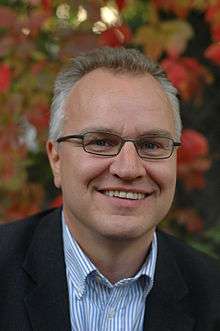Kristian Berg Harpviken
Kristian Berg Harpviken (born 27 December 1961) is a Norwegian sociologist and researcher, and since 2009 director of the Peace Research Institute Oslo (PRIO). Harpviken is foremost known for his competence on Afghanistan, where he has travelled extensively and conducted multiple field works since he first engaged with the country in 1989.
Kristian Berg Harpviken | |
|---|---|
 | |
| Born | 26 December 1961 Lillehammer, Norway |
| Alma mater | University of Oslo |
| Scientific career | |
| Fields | Sociology, Peace and conflict studies |
| Institutions | Peace Research Institute Oslo |
| Director of Peace Research Institute Oslo | |
| In office 1 July 2009 – 30 June 2017 | |
| Preceded by | Stein Tønnesson |
| Succeeded by | Henrik Urdal |
Education and work experience
Harpviken has both practical and academic education. He is a trained horticulturalist and has worked as a farmer for several years. He has his cand.mag., 4 years undergraduate degree (1989) and cand.polit., 2 years post-graduate degree (1995) from University of Oslo, both in Sociology. He has been a guest researcher at the University of Chicago (1998) and Georgetown University (2008).
His cand. polit. thesis (equivalent to an M. Phil.) was entitled Political Mobilization Among the Hazara of Afghanistan, 1978–1992. In 2006 he defended his doctoral dissertation in sociology, entitled Networks in Transition: Wartime Migration in Afghanistan. Besides the main concentration on sociology, he has studied business and development studies.
Between studies, Harpviken has served as agricultural coordinator and director for the Norwegian Afghanistan Committee in Peshawar, Pakistan (1990–92). He also served 4 months conscientious objector duty for the same organization in 1989. Harpviken fulfilled 12 months compulsory military service in 1981, and trained as a conscript sergeant with specialization in mortars.
Since 1993, Harpviken has been affiliated with PRIO, first as a student associate, from 1995 as researcher, then moving on to positions as senior researcher, deputy director, and now director. He has participated and led multiple long-term projects on anti-personnel landmines, internally displaced and refugees, peacebuilding, as well as regional security. In 2004–05 he was the programme leader of PRIO's research programme Conflict Resolution and Peacebuilding (CRPB). Additionally, he has provided consultancy services to several international NGOs and multilateral organizations.
Research interests
Harpviken's specialties and research interests include the dynamics of civil war (mobilization, conflict resolution, post-war reconstruction and peacebuilding), migration and transnational communities, and methodology in difficult contexts. Geographically, his research is primarily focused on Afghanistan and the region, but he also has fieldwork experience from Angola, Bosnia-Herzegovina, Iran, Mozambique, Pakistan; in large part related to the landmine situation and the landmine campaign. He has taught several courses on methodology in crisis situations both for practitioners and graduate university students.
Dissemination and outreach
Harpviken frequently comments in national media on the situation in Afghanistan, and he is also concerned with Norway's peace policy and other aspects of foreign policy. As director of PRIO, he speculated and commented each year on the Nobel Peace Prize in media outlets from all over the world.
In 2009, he was awarded the Norwegian Sociological Association's (Eastern branch) Dissemination Award.
Bibliography (selected)
- Kristian Berg Harpviken & Sarah Lischer, 2013. "Refugee Militancy in Exile and Upon Return in Afghanistan and Rwanda", in Jeff Checkel (ed.): Transnational Dynamics of Civil War, Cambridge: Cambridge University Press.
- Kristian Berg Harpviken, 2012. "The Transnationalization of the Taliban", International Area Studies Review", 15(3): 203–229.
- Kristian Berg Harpviken, 2012. "Warlordism: Three Biographies from Southeastern Afghanistan", in Astri Suhrke & Mats Berdal (eds.): The Peace in Between: Post-war Violence and Peacebuilding, London: Routledge.
- Kristian Berg Harpviken, 2011. "A Peace Nation in the War on Terror: The Norwegian Engagement in Afghanistan", in Nik Hynek & Peter Marton (eds.): Statebuilding in Afghanistan: Multinational Contributions to Reconstruction, London: Routledge.
- Kaja Borchgrevink & Kristian Berg Harpviken, 2010. "Afghanistan: Civil Society Between Modernity and Tradition", in Thania Pfaffenholz (ed.): Civil Society and Peacebuilding, Boulder, CO: Lynne Rienner, pp. 235–257.
- Kristian Berg Harpviken (ed.) 2010. Comparative Social Research, Volume 27 – Troubled Regions and Failing States: The Clustering and Contagion og Armed Conflicts. Bingley, UK: Emerald.
- Kristian Berg Harpviken, 2010. "Caught in the Middle? Regional Perspectives on Afghanistan", Comparative Social Research, Vol. 27: 277–305. Bingley, UK: Emerald.
- Astri Suhrke, Torunn Wimpelmann Chaudhary, Aziz Hakimi, Kristian Berg Harpviken, Akbar Sarwari & Arne Strand, 2009. Conciliatory Approaches to the Insurgency in Afghanistan: An Overview, CMI Report 2009:1. Bergen: Chr. Michelsen Institute.
- Kristian Berg Harpviken, 2009. Social Networks and Migration in Wartime Afghanistan. Basingstoke: Palgrave Macmillan.
- Kristian Berg Harpviken & Hanne Eggen Røislien, 2008. "Faithful Brokers? Potentials and Pitfalls of Religion in Peacemaking", Conflict Resolution Quarterly, 25(3): 351–373.
- Kristian Berg Harpviken (ed.), 2004. The Future of Humanitarian Mine Action. Basingstoke: Macmillan.
- Kristian Berg Harpviken, 2003. "Afghanistan: From Buffer State to Battleground – to Bridge Between Regions?", in James Hentz og Morten Bøås (ed.): New and Critical Security and Regionalism: Beyond the Nation State, Aldershot: Ashgate, pp. 152–176.
- Astri Suhrke, Kristian Berg Harpviken & Arne Strand, 2003. "After Bonn: Conflictual Peacebuilding", Third World Quarterly, 23(4):875–891.
- Kristian Berg Harpviken, 1997. "Transcending Traditionalism: The Emergence of Non-State Military Formations in Afghanistan", Journal of Peace Research
- Kristian Berg Harpviken, 1996. Political Mobilisation Among the Hazara of Afghanistan: 1978–1992, Rapportserien ved Sosiologi, Nr 9:1996, Oslo: Institutt for Sosiologi, Universitetet i Oslo.
External links
- Staff page at PRIO
- Staff page at University of York
- Publisher Macmillan's Harpviken biography
- Harpviken's publications in the Norwegian publication system Cristin